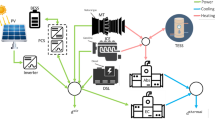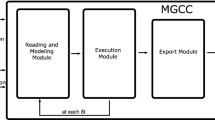Abstract
In this paper, a two-level model for probabilistic microgrid scheduling, considering the uncertainties of electricity price and predicted load, is present for microgrid performance in both island mode and connection to the main grid. The two-level model of ideal microgrid scheduling using the Banders decomposition method is decomposing into the main problem for operation in the main grid connection mode and subproblems for performance in island mode. The primary problem's objective function is to reduce the cost of microgrid performance, while the subproblem's objective function looks at the adequacy of microgrid production and the microgrid's ability to serve loads without interruption in the case of islands. In this method, if there is not enough power to supply loads in the mode of existing islands, a cut is added to the main issue to revise the microgrid performance program. Finally, the simulation results for both the microgrid connection mode to the main grid and the islands mode are present. In both modes, the modeling results demonstrate excellent microgrid performance.





















Similar content being viewed by others
References
Khan MW, Wang J, Ma M, Xiong L, Li P, Fei W (2019) Optimal energy management and control aspects of distributed microgrid using multi-agent systems. Sustain Cities Soc 44:855–870. https://doi.org/10.1016/j.scs.2018.11.009
Liu C, Wang X, Xiong Wu, Guo J (2017) Economic scheduling model of microgrid considering the lifetime of batteries. IET Gener Transm Distrib 11(3):759–767
Azim R, Hantao C, Fangxing L (2016) Power management strategy combining energy storage and demand response for microgrid emergency autonomous operation. In: 2016 IEEE PES Asia-Pacific power and energy engineering conference (APPEEC), pp 2620–2625. IEEE
Krishnamurthy V, Kwasinski A (2016) Effects of power electronics, energy storage, power distribution architecture, and lifeline dependencies on microgrid resiliency during extreme events. IEEE J Emerg Sel Topics Power Electron 4(4):1310–1323
Alzahrani A, Ferdowsi M, Shamsi P, Dagli CH (2017) Modeling and simulation of microgrid. Procedia Comput Sci 114:392–400
Liu G, Starke M, Xiao B, Zhang X, Tomsovic K (2017) Microgrid optimal scheduling with chance-constrained islanding capability. Electric Power Syst Res 145:197–206. https://doi.org/10.1016/j.epsr.2017.01.014
Sedighizadeh M, Esmaili M, Jamshidi A, Ghaderi M-H (2019) Stochastic multi-objective economic-environmental energy and reserve scheduling of microgrids considering battery energy storage system. Int J Electr Power Energy Syst 106:1–16
Cheng J, Duan D, Cheng X, Yang L, Cui S (2020) Probabilistic microgrid energy management with interval predictions. Energies 13(12):3116
Contreras SF, Cortés CA, Myrzik JMA (2020) Probabilistic multi-objective microgrid planning methodology for optimizing the ancillary services provision. Electr Power Syst Res 189:106633
Gao K, Wang T, Han C, Xie J, Ma Y, Peng R (2021) A review of optimization of microgrid operation. Energies 14:1–39
Ahmed D, Ebeed M, Ali A, Alghamdi AS, Kamel S (2021) Multi-objective energy management of a micro-grid considering stochastic nature of load and renewable energy resources. Electron 10:1–22
Jain S, Sawle Y (2021) Optimization and comparative economic analysis of standalone and grid-connected hybrid renewable energy system for remote location. Front Energy Res 9:1–17
Hosseinimoghadam SMS, Hamzeh R, Masoud D, Seyed MR (2020) Size optimization of distributed generation resources in microgrid based on scenario tree. In: 2020 8th international conference on smart grid (icSmartGrid), pp 67–72. IEEE
Dashtdar M, Najafi M, Esmaeilbeig M (2020) Probabilistic planning for participation of virtual power plants in the presence of the thermal power plants in energy and reserve markets. Sādhanā. https://doi.org/10.1007/s12046-020-01335-z
Khodaei A (2013) Microgrid optimal scheduling with multi-period islanding constraints. IEEE Trans Power Syst 29(3):1383–1392
Zaree N, Vahid V, Abouzar E (2018) Energy management strategy of microgrids based on benders decomposition method. In: 2018 IEEE international conference on environment and electrical engineering and 2018 IEEE industrial and commercial power systems europe (EEEIC/I&CPS Europe), pp 1–6. IEEE
Li Y, Yang Z, Li G, Zhao D, Tian W (2018) Optimal scheduling of an isolated microgrid with battery storage considering load and renewable generation uncertainties. IEEE Trans Industr Electron 66(2):1565–1575
Nojavan S, Majidi M, Esfetanaj NN (2017) An efficient cost-reliability optimization model for optimal siting and sizing of energy storage system in a microgrid in the presence of responsible load management. Energy 139:89–97. https://doi.org/10.1016/j.energy.2017.07.148
Sadegh HSM, Dashtdar M, Dashtdar M, Roghanian H (2020) Security control of islanded micro-grid based on adaptive neuro-fuzzy inference system. Sci Bull: Ser C Electr Eng Comput Sci 1:189–204
Dashtdar M, Najafi M, Esmaeilbeig M (2020) Calculating the locational marginal price and solving optimal power flow problem based on congestion management using GA-GSF algorithm. Electr Eng 102(3):1549–1566. https://doi.org/10.1007/s00202-020-00974-z
Fossati JP, Galarza A, Martín-Villate A, Echeverría JM, Fontán L (2015) Optimal scheduling of a microgrid with a fuzzy logic controlled storage system. Int J Electr Power Energy Syst 68:61–70
Luo L, Abdulkareem SS, Rezvani A, Miveh MR, Samad S, Aljojo N, Pazhoohesh M (2020) Optimal scheduling of a renewable based microgrid considering photovoltaic system and battery energy storage under uncertainty. J Energy Storage 28:101306. https://doi.org/10.1016/j.est.2020.101306
Author information
Authors and Affiliations
Corresponding author
Additional information
Publisher's Note
Springer Nature remains neutral with regard to jurisdictional claims in published maps and institutional affiliations.
Rights and permissions
About this article
Cite this article
Dashtdar, M., Flah, A., Hosseinimoghadam, S.M.S. et al. Optimization of microgrid operation based on two-level probabilistic scheduling with benders decomposition. Electr Eng 104, 3225–3239 (2022). https://doi.org/10.1007/s00202-022-01540-5
Received:
Accepted:
Published:
Issue Date:
DOI: https://doi.org/10.1007/s00202-022-01540-5




